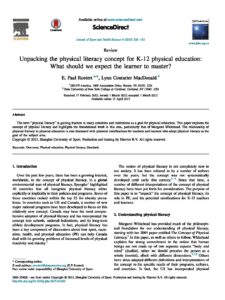-
Physical Fitness Measures Among Adolescents With High and Low Motor Competence
Abstract Physical fitness level is considered to yield substantial health benefits. Earlier studies have demonstrated poor physical fitness outcomes and reduced level of physical activity… -
The Validity and Reliability Study of the Basic Motor Movement, Social Skill Observation, and Evaluation Scale for Basic Movement Education
Abstract It is aimed to develop a measurement tool which is a basic motor movement, social skill, attitude observation and evaluation scale for Basic Movement… -
A Discriminant Analysis of Personality Traits and Cluster Types of Physical Education Teachers
Abstract This paper understands the personality traits and cluster types of physical education (PE) teachers in elementary schools. A total of 393 elementary PE teachers… -
The Mediator Role of Sport Competence and Physical Condition in the Motivational Climate and Personal-Social Responsibility in Physical Education
Abstract This study aimed to separately examine the mediator role of two different variables in the relationship between perceived motivational climate and personal-social responsibility in… -
Practicum in Physical Education Teacher Education: An Educational Partnership?
Abstract The national curricula for physical education teacher education (PETE) in Norway require that practicum is carried out in a partnership between student teachers, cooperating… -
Narratives From YouTube: Juxtaposing Stories About Physical Education
Abstract The aim of this paper is to explore what is performed in students’ and teachers’ actions in physical education practice in terms of “didactic… -
Conceptual physical education: A course for the future
Abstract The conceptual physical education (CPE) innovation began in the mid-20th century as an alternative approach to college-level, activity-only basic instruction classes. In addition to… -
State laws governing school physical education in relation to attendance and physical activity among students in the USA: A systematic review and meta-analysis
Abstract Background This study systematically synthesized and quantified the relationship linking state laws governing school physical education (PE) to PE attendance and physical activity (PA)… -
The expectancy-value theory: A meta-analysis of its application in physical education
Abstract Background The purpose of motivating students is to enhance their learning achievement. The expectancy-value theory (EVT) has demonstrated its efficacy in motivating students in… -
Unpacking the physical literacy concept for K-12 physical education: What should we expect the learner to master?
Abstract The term “physical literacy” is gaining traction in many countries and institutions as a goal for physical education. This paper explores the concept of physical literacy… -
Motivational processes in physical education and objectively measured physical activity among adolescents
Abstract Purpose Grounded in self-determination theory (SDT), the present study tested how students’ perceptions of autonomy support from physical education teachers predicts objectively measured moderate-to-vigorous… -
Weight Measurements in School: Setting and Student Comfort
Abstract Objective To examine how body mass index assessments are conducted in schools and whether student comfort with assessments varies by students’ perceived weight status,…













